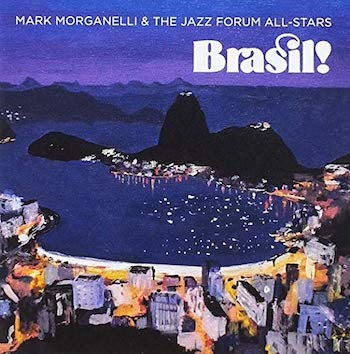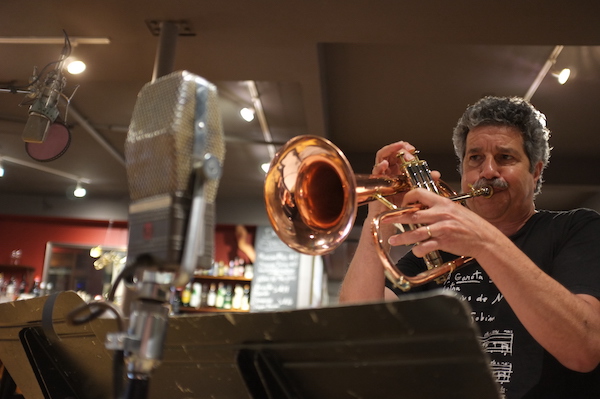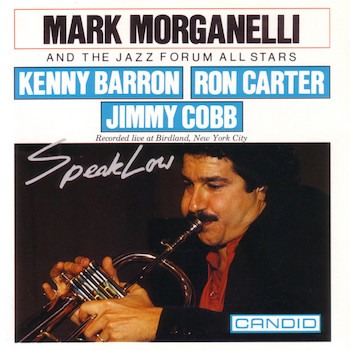Jazz Interview: Trumpeter Mark Morganelli Makes It to Boston — Finally
By Noah Schaffer
“The reason I started the Jazz Forum was to give emerging artists like myself the opportunity to perform.”
 Given its vibrant club and concert scene and music colleges, just about everyone in jazz has played Boston. Except, apparently, for trumpet and flugelhorn player Mark Morganelli. Despite being active since the ’70s with numerous worldwide tours to his credit, Morganelli’s performance at Scullers on December 16 will be his local debut. Part of the reason might be that Morganelli has spent as much time behind the scenes as he has on stage. His Jazz Forum venue was a famed part of the Manhattan scene in the ’80s, and after many years of producing large-scale concerts he recently revived the club, which is now in Tarrytown, New York. Morganelli has also produced dozens of CDs for the Candid label. While never a prolific recording artist, he recently released his fifth album, Brasil! The Jazz Forum All-Stars coming into town will be pianist Helen Sung, bassist Harvie S, and NEA Jazz Master Billy Hart on drums. Morganelli recently spoke to the Arts Fuse from his Tarrytown home. The conversation has been lightly edited for length.
Given its vibrant club and concert scene and music colleges, just about everyone in jazz has played Boston. Except, apparently, for trumpet and flugelhorn player Mark Morganelli. Despite being active since the ’70s with numerous worldwide tours to his credit, Morganelli’s performance at Scullers on December 16 will be his local debut. Part of the reason might be that Morganelli has spent as much time behind the scenes as he has on stage. His Jazz Forum venue was a famed part of the Manhattan scene in the ’80s, and after many years of producing large-scale concerts he recently revived the club, which is now in Tarrytown, New York. Morganelli has also produced dozens of CDs for the Candid label. While never a prolific recording artist, he recently released his fifth album, Brasil! The Jazz Forum All-Stars coming into town will be pianist Helen Sung, bassist Harvie S, and NEA Jazz Master Billy Hart on drums. Morganelli recently spoke to the Arts Fuse from his Tarrytown home. The conversation has been lightly edited for length.
The Arts Fuse: I couldn’t figure out the last time you’d played Boston.
Mark Morganelli: I’ve never played Boston! But I ran the Boston Marathon in 1973 and 1974. In 1973 I dropped out at mile 15 but I finished it in 1974, and more recently I ran a 10K in NYC and met Bill Rodgers. We talked about running Boston and he inscribed his book about the marathon.
AF: You’ve spoken about how being a runner helps being a trumpeter.
Morganelli: It really helps your breathing. It’s especially nice on ballads because you can hold your air better. So I’m still running about 20 miles a week.
AF: The Jazz Forum All-Stars is a rotating group. Can you talk about the process of putting the band together for a gig like this?
Morganelli: I wanted to make it impressive. I like to give myself challenges musically. I’ve only played with Helen Sung once before, at a party at our house. Harvie and I have played together for almost 40 years. Right before the original Jazz Forum went out of business I held the World Bass Festival and presented 21 groups, and he was one of the bassists. Some of the others were Milt Hinton, Ron Carter, and Buster Williams. And Billy Hart recorded on my first record, which came out 40 years ago, and he’s played here at the club. So the four of us have never played together. We’ll meet at sound check and go for it. I’m going to play a mix of Brazilian music from my last double CD, and play one or two from my first album with Billy Hart, and some great jazz standards, and we’ll give things a Miles Davis bent.
AF: : How did you transition from just being a working musician to a club owner and impresario?
Morganelli: : It happened quickly. It started with my four years with the Bucknell Jazz Rock Ensemble, a 23-piece big band. Halfway through my tenure I became the music director and business manager and lead trumpeter. I brought that band to Montreux in 1976, and we opened for Sha Na Na at Wolf Trap the next week, and then did a three-week tour of the US in 1977, and I produced some of our albums, so I got a lot of experience on the business side.
After I came off the road I got a gig with the big band at the Village Gate, and then I got my loft and put together a rehearsal big band. I decided to open it to the public in June 1979. I’m now coming up on my 44th anniversary of presenting jazz. I took out an ad in the Village Voice. Suddenly Clifford Jordan, Dizzy Reece, Roy Haynes, Pepper Adams, Barry Harris, all of these incredible artists were playing at my place.

Trumpet and flugelhorn player Mark Morganelli in action. Photo: Mitchell Seidel
AF: 2022 has been the Mingus centennial, and a lot of the profiles of him have focused on the fact that he was a businessman as well as a musician. What is the importance of artists having entrepreneurial acumen and creating their own opportunities?
Morganelli: The reason I started the Jazz Forum was to give emerging artists like myself the opportunity to perform, because it was very difficult then to get a gig, and the gigs we got were paying $4 a musician. I thought there’s got to be a better way. And then some of the more established artists, who were also struggling, would play there. So I created these opportunities, and continue to create these opportunities 44 years later. I feel good about it. I’ve presented thousands and thousands of nights of concerts. After the Jazz Forum I was at the Village Gate, the music coordinator at Birdland, shows at Carnegie Hall and Lincoln Center, many shows here at the Tarrytown Music Hall, including Dizzy Gillespie’s last public appearance.
AF: The original Jazz Forum was in the heart of the city, and now you’re in the suburbs. Does that reflect how the jazz audience has changed?
Morganelli: What happened was that we decided to sell our house and create this 100-seat club. But yes, with the jazz audience, in a certain way, there’s a lot of activity in the suburbs. There is not the vitality that there used to be in New York proper because a lot of entrepreneurs have been forced out by landlords demanding high rents. You know something is wrong when someone like Danny Meyer goes out of business with the Jazz Standard. Yes, it was a casualty of the pandemic, but at the same time he had a very successful club there. Now you’re seeing places in Connecticut, New Jersey, upstate New York, all over the place. There have always been venues in these places, but now they’re booking the marquee acts that have played the major festivals.
AF: You’re a real champion of Brazilian jazz, not just with your last album but also by presenting many Brazilian artists at your club. How did you discover Brazilian music?
 Morganellii: Back when I had the loft I rented it to saxophonist Steve Sacks, who now lives in Japan. He needed the space to rehearse and I got to hear him collaborate with Brazilian musicians, and I fell in love with the music. And then one time I was boating in Central Park and I heard this music on the shore. It was “Pé-De-Boi,” led by percussionist Guilherme Franco. Within a few months I was playing Carnival gigs with that samba band.
Morganellii: Back when I had the loft I rented it to saxophonist Steve Sacks, who now lives in Japan. He needed the space to rehearse and I got to hear him collaborate with Brazilian musicians, and I fell in love with the music. And then one time I was boating in Central Park and I heard this music on the shore. It was “Pé-De-Boi,” led by percussionist Guilherme Franco. Within a few months I was playing Carnival gigs with that samba band.
AF: Why do you think Brazilian music has fascinated so many American jazz musicians?
Morganelli: It goes both ways. I know a lot of Brazilians that love American jazz! So there’s that cross-fertilization. The one that most embodied that was Claudio Roditi, some of whose records I produced. He played in Dizzy’s band, with Slide Hampton, and also in many legendary Brazilian bands, with musicians like Dom Salvador. There’s something infectious and endearing about the rhythms, which are so important, and it all goes back to Africa because the African influence came in through Bahia hundreds of years ago. The samba schools were very popular around the early 1900s and then made a global splash through the movie Black Orpheus, which came out in 1959 and won the Cannes grand prize. That exposed samba to the world. Cross fertilization with jazz musicians, especially Charlie Byrd and Stan Getz, inspired the bossa nova, and that’s kind of a jazz take on samba.
AF: You probably see way more live music than a typical working musician. How does all of that exposure to what musicians are doing impact your own music?
Morganelli: What I see around me influences me a lot. When I see Fred Hersch play four sets of music over a weekend, it’s damn inspiring! And that goes for many others that play here — Monty Alexander, Bill Charlap, Renee Rosnes — these people play on the highest possible level. I first heard Jobim’s “Fotografia” when I presented Eliane Elias with Kenny Barron at Jazz at Lincoln Center. After hearing her perform it I went and found it and I recorded it on Brasil! And tomorrow she’s making her second appearance here, at our tiny club, having just won two Grammys for her last album. And I continue to be inspired by people like Kenny Barron, by George Coleman, who is 87, and Houston Person, who is 88. You can always learn something from the elders, from the progenitors of this music.
Noah Schaffer is a Boston-based journalist and the co-author of gospel singer Spencer Taylor Jr.’s autobiography A General Becomes a Legend. He also is a correspondent for the Boston Globe and DigBoston, and spent two decades as a reporter and editor at Massachusetts Lawyers Weekly and Worcester Magazine. He has produced a trio of documentaries for public radio’s Afropop Worldwide, and was the researcher and liner notes writer for Take Us Home – Boston Roots Reggae from 1979 to 1988.
